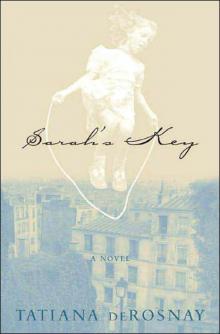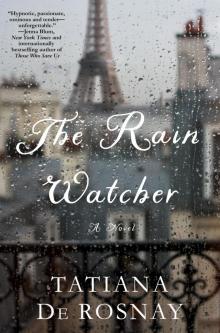- Home
- Tatiana de Rosnay
The Other Story Page 7
The Other Story Read online
Page 7
Time crept by. The rain pattered against the windows. Children and babies whimpered. Bored teenagers played with their mobile phones. Others read. Some people slept. Nicolas looked down at the papers in the folder on his knees. The Russian connection. Zinaïda Koltchine had been born in Leningrad in 1945. Her son, Fiodor, in 1960. Nicolas stared down at the dates. She was fifteen years old when she became a mother. Nicolas was baffled. He had never realized how young his grandmother was when she was still alive. Lionel Duhamel, her husband, now in a geriatric hospital, was fifteen years older than she. Nicolas had never noticed that age difference, either. He now realized Nina Duhamel had been only forty-eight when her son died. How extraordinary that he had not realized this earlier. But then, there was an age, a very young age, he recalled, when everyone over thirty seemed to be a crumbing wreck. There was nothing exotic about Madame Duhamel. Nothing Russian, not even remotely Slavic. No accent. No high cheekbones. She was merely a distinguished, chain-smoking, sophisticated bourgeoise who ran her household with an iron fist and who enjoyed glamorous summers on the Riviera. He had not been close to his paternal grandmother, preferring the motherly warmth of his Belgian granny. Nina Duhamel liked to be called “Mamita” by her offspring. She died in 2000 of lung cancer, at fifty-five years old, seven years after her son’s disappearance. Nicolas’s eyes wandered back to the folder. Fiodor Koltchine, his father. Born of a stranger. Fiodor Koltchine. Even the name made him shiver, as ominous and as unfamiliar as Keyser Söze, the enigmatic gangster in his favorite movie, The Usual Suspects.
A question mark had popped up in Nicolas Duhamel’s conventional family tree. He obtained his certificat de nationalité française easily enough, as his grandmother became French when she married Lionel Duhamel in 1961, and Nicolas had the necessary papers to prove that official act. But the question mark remained, hovering in his mind, looming larger and larger, buzzing about like an annoying mosquito, even as his new passport was issued. Who had fathered Zinaïda’s baby? And what had his own father, Théodore, known about his origins?
He had questioned his aunt Elvire Duhamel, Lionel and Nina’s forty-three-year-old daughter. She was a wiry woman, divorced, who lived in Montmartre with two cats. Her teenaged children, Alina and Carlos, Nicolas’s cousins, lived in Barcelona with her ex-husband, an alcoholic Spaniard. Their phone conversation was a fleeting, unsatisfactory one. “On her deathbed, Mother told me my brother had another name, a Russian one, and that he wasn’t Lionel’s son. What? Why did she tell me? She had just been diagnosed with lung cancer, Nicolas! She thought she was going to pop off any minute. Guess she wanted a clear conscience. She ended up living another six months, mind you. She never mentioned it again. And don’t you dare go talking about this to my father. He’s dotty enough as it is.” Lionel Duhamel, approaching seventy-six, suffered from Alzheimer’s and was in a geriatric hospital. Nicolas was confronted with the disagreeable reality of dementia and old age whenever he went to visit his grandfather (who, in fact, was not his grandfather, as he now liked to remind himself, with a touch of angst). With Emma’s help, Nicolas found the family tree he’d drawn in class with such care as a boy at the elementary school on the rue Rollin. The Belgian branch on one side, the French on the other: Duhamel and Van der Vleuten. There was nothing French about him, he realized during that long wait at the Pôle de la nationalité française. The irony of it nearly made him chuckle out loud, but the sobbing old man next to him girdled his mirth. He was no Duhamel. He was Russian and Belgian. He was a Koltchine–Van der Vleuten mix. And he would probably never find out who his paternal grandfather was. That mere thought opened up an abyss under his feet. Nicolas Duhamel’s placid, tranquil existence was no more. That gray day, as he waited over two hours at the Pôle, staring down at the papers on his lap, he felt a subtle shift in the world around him, as if unknown hands were tampering with his fate.
That was the day Nicolas Kolt was born, but he did not know that yet. And that was also the day Margaux Dansor first wove her way into his existence.
IT TOOK NICOLAS UNDER a year to write The Envelope, and it irks him to recall the smoothness of that routine, now that he is faced with the growing bulk of his procrastination. As he sips his fruit cocktail, he thinks of how he used to rise at dawn with ease and enthusiasm, before Delphine took her daughter, Gaïa, to school; he’d make tea and sit at the kitchen table. He wrote the novel by hand, in black notebooks like the empty one on his lap now, and then he typed the text into his MacBook, and it all flowed miraculously. Perhaps Delphine’s kitchen is the only place he can write? He misses Delphine. He misses his life with her. The simplicity of it, the rhythm of it. Before Hurricane Margaux, Delphine was the busy bee of the two of them. She worked in a real estate agency and spent her days showing apartments to clients. Delphine was the one who found the rue du Laos duplex for them—or rather, for him. She never ended up living there with Nicolas, as their breakup took place the week he moved. She and Gaïa stayed in the modern building on the rue Pernety, just above the post office, and Nicolas went to live in the huge duplex by himself.
Before he embarked on the adventure of the novel, Nicolas rose late, puttered around, gave his philosophy lessons, went to pick up Gaïa at school when she was too small to go home alone. He did the shopping along the rue Raymond Losserand—he was a favorite with the long-haired fishmonger, the Algerian fruit vendor, the beaming dry-cleaning lady from Haiti, Claudia—he did the washing, the cooking, the laundry. He did not mind being a kept man. It gave him a thrill to hear Delphine’s key in the lock, her face lighting up when she set eyes on him, her pleasure at the meal he had prepared, the wine he had chosen. Gaïa was put to bed and told a story, and then they had the evening to themselves.
When Delphine and Nicolas met for the first time in 2004, he was twenty-two. There had been nothing thrilling in his life since his trip to Italy with François in the summer of 2003, after the debacle of his studies. He still felt the brunt of his mother’s discontent, although Emma never voiced it. Their cohabitation in the rue Rollin apartment was a strained one. Emma wanted him to move out, yet she could not bear the idea of being alone. Nicolas longed for freedom, but his tutorials did not bring him enough money to pay rent on his own.
One fall evening, Lara (who had not passed the khâgne exam either, but who did not care, as she had just landed a job at a prestigious magazine) took him to L’Entrepôt, a trendy restaurant in the fourteenth arrondissement. After Lara left, a woman asked him how he was feeling. He was drunk, sprawled over the bar, wrapped in a dreamy, nauseous stupor, but lucid enough to notice she was attractive, with creamy white skin and auburn hair. Delphine took him back to her place, five minutes away, but it took over half an hour to get there, as he could barely stand up. He blacked out as soon as he collapsed on her sofa, and opened bewildered eyes the next morning, confused as to his whereabouts. She was reading, sipping a cup of coffee, wearing glasses and a man’s shirt, with nothing much underneath. He fell in love with her then and there.
After the breakup in 2009, it was in the splendor of the rue du Laos apartment that Nicolas realized he no longer had the energy to write. He put his lethargy down to Delphine’s departure. “I don’t like who you have become, Nicolas,” Delphine had said bitingly on the phone during that final and awful conversation. “I don’t like the full-of-himself, arrogant little bastard you like to pretend you are and that maybe you really have become.” He tried to interrupt her, feebly, although he knew it was useless. Delphine, once she was started, was like a freight train; nothing stopped her. And so out it all came. Nicolas stood on the top terrace of the duplex, looking out to the Champ de Mars and the Eiffel Tower, braced himself, and listened. “Of course, we all know that being exposed to such an overwhelming success is risky. I’m not saying you’ve been unfaithful to me. I know—I hope?—you haven’t, and I’m not even talking about that. I’m talking about how you used to care for people. You used to care, Nicolas. You used to listen. You were there. That’s go
ne. Now you’re a hot It Boy everyone hungers for. And the worst thing is, you’ve grown to like it.… No, don’t interrupt me. You never used to be vain. Now you look at yourself in shop windows, for Christ’s sake. Whenever you go anywhere, even into a supermarket, you check to see if someone has recognized you. You Google yourself all day long. You spend hours reading posts on your Facebook page. You seem to think that tracking down the Nicolas Kolt hashtag on Twitter is more important than talking to me, or my daughter, or your poor mother. Where is the Nicolas Duhamel who used to wash dishes and crack jokes when I got home? Now you’re either on a book tour or getting drunk at some cocktail party. This is not the kind of life I want with you. I’m thrilled, really, that the book has changed your life and that the world is at your feet.… No, don’t interrupt me. But that book opened our bedroom door to thousands of people. I can’t stand that anymore. I could, if you were being more mature about it. But you are not. You are like a spoiled little boy who got too many presents for his birthday. Listen to me, Nicolas. Gaïa and I are not coming to live with you. You are going to live on rue du Laos all by yourself. Maybe you’ll finally wake up and see what you’re doing to your life. Life isn’t one big book tour, Nicolas. Life isn’t about being recognized in the street by adoring readers. Life isn’t about how many people follow you on Twitter and how many friends you have on Facebook. Please tell Nicolas Kolt that I’m not impressed by him. Good-bye.” She hung up. Since then (this was two years ago), Nicolas has swallowed his pride and Delphine has stopped being so resentful. They have not gotten back together, but they remain friends.
The rue du Laos duplex felt like a gigantic white box for the first two weeks. Nicolas kept waking up in the middle of the night, disoriented, wondering where he was and why Delphine was not in bed with him. Why did this space feel so huge, and he so puny? His mother, when she came to visit, said tentatively, “Hmmm … It’s big, isn’t it?” At first, he threw wild, loud parties where people danced, screamed, tossed bottles from windows till dawn, and the police were called. He was informed by the building management that if this went on, he’d be thrown out.
Six months after the breakup, Nicolas felt the need to get back to the book. The one that obsessed him, although he had not written a line of it. Why had his stamina fizzled out? What had happened to Rascar Capac and the blue haze? Where was the key to the secret world he used to disappear into?
Nicolas had Gaïa’s pink room (the one she never moved into) repainted a subtle and soothing blue, he bought a long and narrow black table from Vitra, a new chair, a new lamp, and he sat down to write. All he could see was Delphine’s face on the screen of his MacBook. After twenty minutes of nothing (nothing meaning a few sentences typed out at a snail’s pace and promptly erased), he pushed the laptop aside and tried pen and paper. Where was his father’s Montblanc? He searched high and low for it. He had not seen it since the move. He decided that he could not write his new book without it. He did not dare call Delphine; she was probably busy showing apartments to clients and would not appreciate being disturbed, especially by him. So he texted her. “Hi. Sorry. Do you know where my father’s Montblanc is, by any chance?” And she texted back. “No idea. Good luck.” He finally found it in a jacket he hadn’t worn for a while.
Armed with the Montblanc, Nicolas sat down once more, pen poised above the paper. His new cleaning lady shuffled about quietly, anxious not to disturb his concentration, and he felt so embarrassed that he actually pretended to write. He wrote a love letter to Delphine that he knew he would never send.
It soon became clear to Nicolas that he would get no writing done in the duplex. Its grandiosity somehow warped his creativity and accentuated his indolence. He tried to write in a nearby café on the avenue de la Motte-Picquet, but he became distracted by watching passersby come and go.
At his wit’s end, Nicolas decided to rent a seventy-five-square-foot room at the top of a nearby building on the avenue de Lowendal, five minutes away. It had the aspect of a monk’s cell, with a cracked, jaundiced washbasin in one corner and a scaly radiator in the other. It gave onto an identical bourgeois building on the other side of the courtyard and seemed perfectly peaceful. Nicolas was delighted. This was just what he needed to get the writing process back into swing and to put his sloth at bay. He bought an old school desk at the flea market, a plain wooden chair from Ikea. The only luxury was a tall, slim Costanza lamp. This is great, he thought, striding with energy and purpose to his new cubbyhole of an office with his Montblanc and his Moleskine. Humming, he took the derelict, antiquated elevator, which made alarming noises all the way up, and installed himself at the desk. Nicolas stretched his arms, unclenched his fingers, and started to write. Again, he wrote to Delphine. He wrote her a long, beautiful (he was convinced it was beautiful) love letter. This was an excellent beginning; it would turn out to be a moving, tender love story. He imagined Alice Dor’s enthusiasm—he could even see the cover of the book—and he already pictured himself talking about it to journalists, “After the breakup, I was so distraught…” As he gazed outside, he caught a flitting motion in the apartment directly in front of him. There were three little windows lined with green-and-blue curtains. The movement happened again, and Nicolas, astonished, saw a young nude woman running from one room to the other—or rather, prancing—arms outstretched, head held high with the grace of a ballerina. Her pert breasts bounced up and down enticingly; her dark hair rippled down her back. Nicolas could see her perfectly, her pale, smooth skin, her round buttocks, tight and muscular, her flat belly and the delta of trimmed pubic hair. Intrigued, aroused, he put his pen down and continued to look. Impervious, she continued her flouncing, and he wondered how it was possible that she had no idea she was being watched. Perhaps she did know, and she liked it. It was difficult to tear his eyes away from the naked ballerina and return to the sentences on the paper. Even more so when she effortlessly lifted her leg, an ankle in her palm, offering him a remarkable view of her pudenda. Nicolas felt his throat become uncomfortably dry. He was never going to get any writing done at this rate. Or he would have to paste paper in his window.
The next day, he (reluctantly but bravely) turned his desk away from the window so that the tantalizing ballerina was out of view. He managed to regain some sort of concentration. Just as he was happily scribbling away, describing Delphine’s hips under the shower, he heard a grunt, so loud and so near, he thought it came from just behind him. There it was again, masculine, low and rumbling, and definitely sexual. It came from the room on his left. His heart sank. He sat there, helpless, as the grunts gained in intensity and rhythm. How was he ever going to get any writing done at all with a nude ballerina and an audio version of the Kama Sutra behind paper-thin walls? The grunts became groans, and a foreign language could be heard. A loud thump made Nicolas jump, then a bang, followed by screeches that curdled his blood. He crept up to open the door a crack. More crashes, cries, and thumps. A silhouette stepped out from the next room and startled him. He made out a hugely tall person of undetermined gender and of pyramidal form, meaty latex-swathed thighs and stilettos. Another burly figure appeared, equally monstrous, wearing a Louis XIV–style wig of cascading platinum curls, knee-high black leather boots, fishnet tights, and a plastic minidress. Nicolas gaped as the two creatures lumbered toward the elevator, making the floorboards shudder, chatting in Portuguese. Hookers? Transvestites from Brazil? Whatever they were, he would only be able to write when they were not around.
Then, when things seemed to have calmed down, a young man whom Nicolas never saw rented the room on the right. He spent his life there, mournfully strumming away from morning till night on a badly tuned guitar and bleating out the same James Blunt song in an unbearable falsetto. Nicolas wanted to murder the young man. One afternoon, a female voice was heard along with the mewl. The young woman’s voice was perhaps even worse than the young man’s because it was so tragically off-key. Nicolas understood, with a sinking heart, that his neighbor had invested in a
karaoke machine. The couple slaughtered “Imagine” and butchered “Let It Be.” Next came “Summer Nights,” “All by Myself,” and “My Way.” It was so excruciating to listen to that Nicolas began to laugh. He laughed so hard that tears came. He even taped some of the karaoke with his mobile so he could play it for his friends. The following day, the young couple went through endless successions of rapid, brutal sex. Nicolas endured it all—the bedsprings creaking wildly, the labored breathing. It did not turn him on in the least. It was perhaps worse than the karaoke. The young man squealed like a pig being slaughtered and the young woman remained stoically mute except for a final terrifying croak that did not sound human. Nicolas found he could not bring himself to bang on the wall to complain. What if one of them was a fan, the clinging kind? The kind that would come knocking every ten minutes? He could not risk that. So he bought earplugs at the pharmacy on the avenue de Lowendal. He shoved them as far as he could into his ears, so that the squeals and croaks became faint. Now he picked up the regular thump of his own heart. It was a strange and disconcerting sound, but infinitely better than the dreadful duo.
As Nicolas sat at his desk day after day, getting up from time to time to look out of the window (always hoping for a glimpse of the ballerina), he found his concentration to be disastrously fickle. Anything distracted him. Even the old lady on the seventh floor, a bent-over, century-old, white-haired granny, was interesting to watch. She spent the day reading, resting, then going out to her terrace and cooing at her plants, the birds, the blue of the sky. Once, she fell asleep in her deck chair, her head tilted to one side, her skirt askew, revealing frail, knobby knees, and she slept for so long, he feared she might have died. Luckily, she stirred, woke up, and hobbled off again. Nicolas felt like James Stewart in Rear Window, reveling in the permanent show his neighbors had to offer. On the fourth floor, a young mother played with her small children with patience and pleasure, and he enjoyed watching her. On the fifth floor, a woman who looked astonishingly like a Pedro Almodóvar movie actress (It had to be her! How could it not be her?) paced up and down, perpetually on the phone, a cigarette hanging from her lips. When she sat at her desk and opened her computer, if he strained his eyes, he could just make out what she was looking at.

 A Secret Kept
A Secret Kept Sarah's Key
Sarah's Key A Paris Affair
A Paris Affair The Other Story
The Other Story The House I Loved
The House I Loved The Rain Watcher
The Rain Watcher